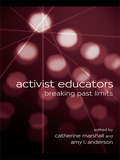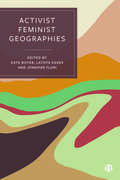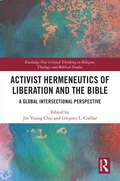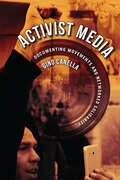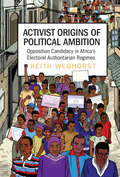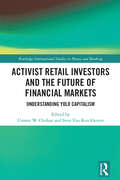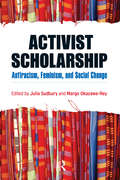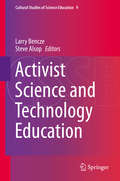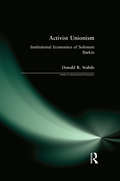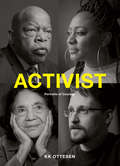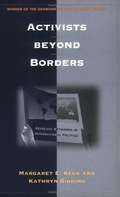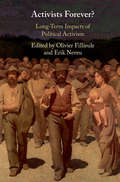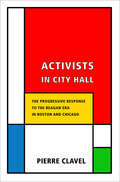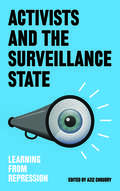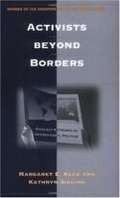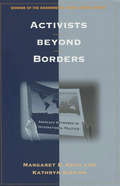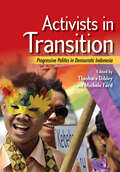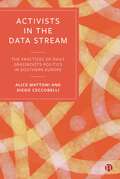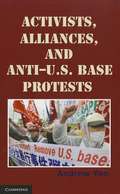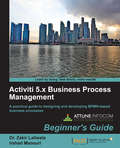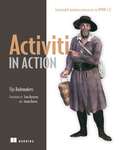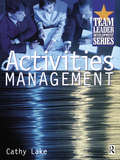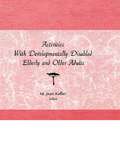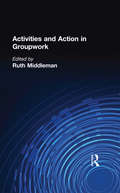- Table View
- List View
Activist Educators: Breaking Past Limits (Teaching/Learning Social Justice)
by Catherine Marshall Amy L. AndersonTaking an active stand in today's conservative educational climate can be a risky business. Given both the expectations of the profession and the challenge of participation in social justice activism, how do educator activists manage the often competing demands of professional and activist commitments? Activist Educators offers a view into the big picture of assertive idealistic professionals’ lives by presenting rich qualitative data on the impetus behind educators’ activism and the strategies they used to push limits in fighting for a cause. Chapters follow the stories of educator activists as they take on problems in schools, including sexual harassment, sexism, racism, reproductive rights, and GLBT rights. The research in Activist Educators contributes to an understanding of professional and personal motivations for educators’ activism, ultimately offering a significant contribution to aspiring teachers who need to know that education careers and social justice activist causes need not be mutually exclusive pursuits.
Activist Feminist Geographies
by Kate Boyer, LaToya E. Eaves, and Jennifer FluriExploring what it means to enact feminist geography, this book brings together contemporary, cutting-edge cases of social justice activism and collaborative research with activists. From Black feminist organizing in the American South to the stories of feminist geography collectives in Latin America, the editors present contemporary case studies from the global north and south. The chapters showcase the strength and vibrancy of activist-engaged scholarship taking place in the field and serve as a call to action, exploring how this work advances real-world efforts to fight injustice and re-make the world as a fairer, more equitable, and more accepting place.
Activist Hermeneutics of Liberation and the Bible: A Global Intersectional Perspective (Routledge New Critical Thinking in Religion, Theology and Biblical Studies)
by Jin Young Choi Gregory L. CuéllarInspired by the current political moment around the globe in which uprisings, protests, revolutions, and movements are on the rise, this book examines the intersections between the Bible and activism. It does this by showcasing intersectional readings of the Bible as an activist act and a tool for activism; historicizing the uses of the Bible within activist/freedom movements around the globe; and offering activist approaches to teaching the Bible.Each chapter in this volume provides a critical and substantive response from the discipline of Biblical Studies to global political trends. International in scope, with contributors from Africa, Asia, Caribbean, Europe, Latin America, Oceania and the United States, they address themes such as gender politics, racial injustices, violence toward women, political resistance, and activist hermeneutics and pedagogies. Together they harness the intellectual energies of minoritized Biblical scholars in a nonessentialist manner to reflect on the Bible as a tool for liberating social and political change. Reflecting on the activist potential of the Bible, this book will be of keen interest to scholars in Biblical Studies, Political Theology, and Religious Studies.
Activist Media: Documenting Movements and Networked Solidarity
by Gino CanellaNow more than ever, activists are using media to document injustice and promote social and political change. Yet with so many media platforms available, activists sometimes fail to have a coherent media and communication strategy. Drawing from his experiences as a documentary filmmaker with Black Lives Matter 5280 and Service Employees International Union (SEIU) Local 105 in Denver, Colorado, Gino Canella argues that activist media create opportunities for activists to navigate conflict and embrace their political and ideological differences. Canella details how activist media practices—interviewing organizers, script writing, video editing, posting on social media, and hosting community screenings—foster solidarity among grassroots organizers. Informed by media theory, this book explores how activists are using media to mobilize supporters, communicate their values, and reject anti-union rhetoric. Furthermore, it demonstrates how collaborative media projects can help activists build broad-based coalitions and amplify their vision for a more equitable and just society.
Activist Origins of Political Ambition: Opposition Candidacy in Africa's Electoral Authoritarian Regimes
by Keith WeghorstWhy do people run for office with opposition parties in electoral authoritarian regimes, where the risks of running are high, and the chances of victory are bleak? In Activist Origins of Political Ambition, Keith Weghorst offers a theory that candidacy decisions are set in motion in early life events and that civic activism experiences and careers in civil society organizations funnel aspirants towards opposition candidacy in electoral authoritarian regimes. The book also adapts existing explanations of candidacy decisions derived from leading democracies that can be applied to electoral authoritarian contexts. The mixed-methods research design features an in-depth study of Tanzania using original survey data, sequence methods, archival research, and qualitative data combined with an analysis of legislators across authoritarian and democratic regimes in Africa. A first-of-its kind study, the book's account of the origins of candidacy motivations offers contributions to its study in autocracies, as well as in leading democracies and the United States.
Activist Retail Investors and the Future of Financial Markets: Understanding YOLO Capitalism (Routledge International Studies in Money and Banking)
by Usman W. Chohan Sven Van KerckhovenContemporary financial markets have been characterized by sociocultural phenomena such as "meme stocks", the Gamestop short squeeze, and "You Only Live Once (YOLO) trading". These are movements led by small-scale retail investors banding together to participate forcefully in financial markets through decentralized but coordinated actions. This book deploys many different subdisciplines to explore the recent ‘power grabbing’ of retail investors and the online environment that enables them to join the ranks of major financial players, and participate in contemporary capitalism. It offers multiple perspectives on the genesis, role, motivations, power, and future prospects of retail investors as a force in contemporary financial markets. Drawing upon the insights of authors hailing from many different countries, the book frames YOLO capitalism through numerous angles that help to explain the context and the importance of activist retail investors in modern financial markets, and thereby explore the possibilities of a transformed financial future with much wider small-scale participation. The book assesses the potential of online - and other - communities in enabling global coordination in impacting or even driving financial and crypto markets, and the challenges that come with it and weighs the competing narratives both positive and negative regarding YOLO capitalism. It strikes a balanced assessment of their legal, cultural, behavioural, economic, and political roles in modern finance. This book will be of interest to a multidisciplinary and interdisciplinary audience of scholars in financial markets, financial regulation, political economy, public administration, macroeconomics, corporate governance, and the philosophy and the sociology of finance.
Activist Scholarship: Antiracism, Feminism, and Social Change
by Margo Okazawa-Rey Julia SudburyCan scholars generate knowledge and pedagogies that bolster local and global forms of resistance to U.S. imperialism, racial/gender oppression, and the economic violence of capitalist globalization? This book explores what happens when scholars create active engagements between the academy and communities of resistance. In so doing, it suggests a new direction for antiracist and feminist scholarship, rejecting models of academic radicalism that remain unaccountable to grassroots social movements. The authors explore the community and the academy as interlinked sites of struggle. This book provides models and the opportunity for critical reflection for students and faculty as they struggle to align their commitments to social justice with their roles in the academy. At the same time, they explore the tensions and challenges of engaging in such contested work.
Activist Science and Technology Education (Cultural Studies of Science Education #9)
by Larry Bencze Steve AlsopThis collection examines issues of agency, power, politics and identity as they relate to science and technology and education, within contemporary settings. Social, economic and ecological critique and reform are examined by numerous contributing authors, from a range of international contexts. These chapters examine pressing pedagogical questions within socio-scientific contexts, including petroleum economies, food justice, health, environmentalism, climate change, social media and biotechnologies. Readers will discover far reaching inquiries into activism as an open question for science and technology education, citizenship and democracy. The authors call on the work of prominent scholars throughout the ages, including Bourdieu, Foucault, Giroux, Jasanoff, Kierkegaard, Marx, Nietzsche, Rancière and Žižek. The application of critical theoretical scholarship to mainstream practices in science and technology education distinguishes this book, and this deep, theoretical treatment is complemented by many grounded, more pragmatic exemplars of activist pedagogies. Practical examples are set within the public sphere, within selected new social movements, and also within more formal institutional settings, including elementary and secondary schools, and higher education. These assembled discussions provide a basis for a more radically reflexive reworking of science and technology education. Educational policy makers, science education scholars, and science and technology educators, amongst others, will find this work thought-provoking, instructive and informative.
Activist Unionism: Institutional Economics of Solomon Barkin
by Donald R. StabileFirst Published in 1994. Routledge is an imprint of Taylor & Francis, an Informa company.
Activist: Portraits of Courage
by KK OttesenA speech on the radio. A high school literature class. A promise made to a mother.Activism begins in small ways and in unexpected places. In this inspiring book, over forty activists from Billie Jean King to Senator Bernie Sanders and Grover Norquist to Al Sharpton recount the experiences that sparked their journeys and share the beliefs that keep them going. These are citizens who met challenge with action. Their visions for peace, equality, and justice have reshaped American society—from voting to reproductive rights, and from the environment to the economy.• Brings together multiple generations from different (sometimes opposite perspectives)• Features KK Ottesen's luminous photographs revealing passion, purpose and optimism• Powerful narratives that collective remind us that anyone can take the future into their own handsFans of 1960Now, Martha Rosler: Irrespective, and Charles White: A Retrospective will love this book. This book is perfect for:• Activists, old and new• Politically engaged readers • Photography fans• Millennials
Activists Beyond Borders: Advocacy Networks in International Politics
by Margaret E. Keck Kathryn SikkinkSurvey of non-governmental organizations' role in pressing for improvements in areas such as human rights, environmental stewardship and more.
Activists Forever?: Long-Term Impacts of Political Activism (Cambridge Studies in Contentious Politics)
by Olivier Fillieule Erik NeveuActivists Forever? explores the consequences of political involvement on an individual's life. While much of the research in this area has focused on the motivations of entire protests groups, the editors of this volume propose an approach that focuses on actors. This book examines political involvement's socio-biographical effects, or the ways in which political commitment generates or modifies dispositions to act, think, and perceive, in a way that is either consistent with or in contrast to the results of previous socialization. The contents explore what political involvement leads to rather than what causes involvement. Using a variety of case studies, this collection of essays provides global coverage with a focus on participation in major protests in the 1960s and significantly broadens our understanding by looking outside the United States. These essays look at the lasting effects of activists' knowledge, connections, and symbolic capital on their future participation in politics, as well as their personal and professional lives.
Activists In City Hall
by Pierre ClavelIn 1983, Boston and Chicago elected progressive mayors with deep roots among community activists. Taking office as the Reagan administration was withdrawing federal aid from local governments, Boston's Raymond Flynn and Chicago's Harold Washington implemented major policies that would outlast them. More than reforming governments, they changed the substance of what the government was trying to do: above all, to effect a measure of redistribution of resources to the cities' poor and working classes and away from hollow goals of "growth" as measured by the accumulation of skyscrapers. In Boston, Flynn moderated an office development boom while securing millions of dollars for affordable housing. In Chicago, Washington implemented concrete measures to save manufacturing jobs, against the tide of national policy and trends. Activists in City Hall examines how both mayors achieved their objectives by incorporating neighborhood activists as a new organizational force in devising, debating, implementing, and shaping policy. Based in extensive archival research enriched by details and insights gleaned from hours of interviews with key figures in each administration and each city's activist community, Pierre Clavel argues that key to the success of each mayor were numerous factors: productive contacts between city hall and neighborhood activists, strong social bases for their agendas, administrative innovations, and alternative visions of the city. Comparing the experiences of Boston and Chicago with those of other contemporary progressive cities-Hartford, Berkeley, Madison, Santa Cruz, Santa Monica, Burlington, and San Francisco-Activists in City Hall provides a new account of progressive urban politics during the Reagan era and offers many valuable lessons for policymakers, city planners, and progressive political activists.
Activists and Advocates: Toronto's Health Department 1883-1983
by Heather MacdougallFor more than a century, Toronto’s Health Department has served as a model of evolving municipal public health services in Canada and beyond. From horse manure to hippies and small pox to AIDS, the Department’s staff have established and maintained standards of environmental cleanliness and communicable disease control procedures that have made the city a healthy place to live. This centennial history anlyzes the complex interaction of politics, patronage and professional aspirations which determine the success or failure of specific policies and programs. As such, it fills a long neglected gap in our understanding of the development of local health services. Using Toronto’s changing circumstances as a backdrop, the book details the evolution of the international public health movement through its various phases culminating in the modern emphasis on health promotion and health advocacy. By so doing, it demonstrates the significant contribution of preventive medicine and public health activities to Canadian life
Activists and the Surveillance State: Learning from Repression
by Aziz ChoudryThe use of secret police, security agencies and informers to spy on, disrupt and undermine opposition to the dominant political and economic order has a long history. This book reflects on the surveillance, harassment and infiltration that pervades the lives of activists, organizations and movements that are labelled as ‘threats to national security’. Activists and scholars from the UK, South Africa, Canada, the US, Australia and Aotearoa/New Zealand expose disturbing stories of political policing to question what lies beneath state surveillance. Problematizing the social amnesia that exists within progressive political networks and supposed liberal democracies, Activists and the Surveillance State shows that ultimately, movements can learn from their own repression, developing a critical and complex understanding of the nature of states, capital and democracy today that can inform the struggles of tomorrow.
Activists beyond Borders
by Margaret E. Keck Kathryn SikkinkA masterful combination of emerging theory and empirical comparison of one of the most intriguing areas of transnational politics. Keck and Sikkink access a broad range of theory from social movements, international relations, and comparative politics research to glean from a wealth of their own research findings solid and thought-provoking conclusions about the most interesting and least well-understood area of contentious politics in the world today. -Sidney Tarrow, Cornell University (Government) "Activists beyond Borders is a searching exploration of advocacy networks, providing compelling accounts in areas such as human rights and environmental protection and an intriguing glimpse into the transnational politics of the twenty-first century. "-Robert O. Keohane, Duke University Margaret E. Keck and Kathryn Sikkink examine a type of pressure group that has been largely ignored by political analysts: networks of activists that coalesce and operate across national frontiers. Their targets may be international organizations or the policies of particular states. Historical examples of such transborder alliances include anti-slavery and woman suffrage campaigns. In the past two decades, transnational activism has had a significant impact in human rights, especially in Latin America, and advocacy networks have strongly influenced environmental politics as well. The authors also examine the emergence of an international campaign around violence against women.
Activists beyond Borders: Advocacy Networks in International Politics
by Margaret E. Keck Kathryn SikkinkIn Activists beyond Borders, Margaret E. Keck and Kathryn Sikkink examine a type of pressure group that has been largely ignored by political analysts: networks of activists that coalesce and operate across national frontiers. Their targets may be international organizations or the policies of particular states. Historical examples of such transborder alliances include anti-slavery and woman suffrage campaigns. In the past two decades, transnational activism has had a significant impact in human rights, especially in Latin America, and advocacy networks have strongly influenced environmental politics as well. The authors also examine the emergence of an international campaign around violence against women.
Activists in Transition: Progressive Politics in Democratic Indonesia
Activists in Transition examines the relationship between social movements and democratization in Indonesia. Collectively, progressive social movements have played a critical role over in ensuring that different groups of citizens can engage directly in—and benefit from—the political process in a way that was not possible under authoritarianism. However, their individual roles have been different, with some playing a decisive role in the destabilization of the regime and others serving as bell-weathers of the advancement, or otherwise, of Indonesia's democracy in the decades since. Equally important, democratization has affected social movements differently depending on the form taken by each movement during the New Order period. The book assesses the contribution that nine progressive social movements have made to the democratization of Indonesia since the late 1980s, and how, in turn, each of those movements has been influenced by democratization.
Activists in the Data Stream: The Practices of Daily Grassroots Politics in Southern Europe
by Alice Mattoni Diego CeccobelliAvailable Open Access digitally under CC-BY-ND licence This book pulls back the curtain on the link between activism, media and technology in the quiet times of politics when people are not protesting. Introducing the novel concept of the ‘data stream', it explores the intricate ways in which activists interact daily with various types of data and how they navigate the impact of digitalization and datafication on today’s grassroots politics. Through rich, empirical data from Greece, Spain and Italy, Activists in the Data Stream makes a nuanced contribution to our understanding of activists’ daily political engagement in an ever-changing media and political landscape.
Activists, Alliances, and Anti-U.S. Base Protests
by Andrew YeoAnti-U.S. base protests, played out in parliaments and the streets of host nations, continue to arise in different parts of the world. In a novel approach, this book examines the impact of anti-base movements and the important role bilateral alliance relationships play in shaping movement outcomes. The author explains not only when and how anti-base movements matter, but also how host governments balance between domestic and international pressure on base-related issues. Drawing on interviews with activists, politicians, policy makers and U.S. base officials in the Philippines, Japan (Okinawa), Ecuador, Italy and South Korea, the author finds that the security and foreign policy ideas held by host government elites act as a political opportunity or barrier for anti-base movements, influencing their ability to challenge overseas U.S. basing policies.
Activiti 5.x Business Process Management Beginner's Guide
by Dr Zakir Laliwala Irshad MansuriBeing a Packt Beginner's Guide, each chapter follows an easy to understand approach with plenty of screenshots and clear and concise steps to guide you throughout. This book is primarily intended for Business Analysts (BAs) who need to develop a process model for implementation in a Business Process Management system. The book assumes that you have basic knowledge of business analysis; however, no Activiti or Java knowledge is required.
Activiti in Action: Executable business processes in BPMN 2.0
by Tijs RademakersSummary Activiti in Action is a comprehensive tutorial designed to introduce developers to the world of business process modeling using Activiti. Before diving into the nuts and bolts of Activiti, this book presents a solid introduction to BPMN 2.0 from a developer's perspective. About the Technology Activiti streamlines the implemention of your business processes: with Activiti Designer you draw your business process using BPMN. Its XML output goes to the Activiti Engine which then creates the web forms and performs the communications that implement your process. It's as simple as that. Activiti is lightweight, integrates seamlessly with standard frameworks, and includes easy-to-use design and management tools. About the Book Activiti in Action introduces developers to business process modeling with Activiti. You'll start by exploring BPMN 2.0 from a developer's perspective. Then, you'll quickly move to examples that show you how to implement processes with Activiti. You'll dive into key areas of process modeling, including workflow, ESB usage, process monitoring, event handling, business rule engines, and document management integration. Written for business application developers. Familiarity with Java and BPMN is helpful but not required. Purchase of the print book comes with an offer of a free PDF, ePub, and Kindle eBook from Manning. Also available is all code from the book. What's Inside Activiti from the ground up Dozens of real-world examples Integrate with standard Java tooling Table of Contents PART 1 INTRODUCING BPMN 2.0 AND ACTIVITI Introducing the Activiti framework BPMN 2.0: what's in it for developers? Introducing the Activiti tool stack Working with the Activiti process engine PART 2 IMPLEMENTING BPMN 2.0 PROCESSES WITH ACTIVITI Implementing a BPMN 2.0 process Applying advanced BPMN 2.0 and extensions Dealing with error handling Deploying and configuring the Activiti Engine Exploring additional Activiti modules PART 3 ENHANCING BPMN 2.0 PROCESSES Implementing advanced workflow Integrating services with a BPMN 2.0 process Ruling the business rule engine Document management using Alfresco Business monitoring and Activiti PART 4 MANAGING BPMN 2.0 PROCESSES? Managing the Activiti Engine
Activities Management (Team Leader Development Ser.)
by Cathy LakeActivities Management is a comprehensive guide to running a smooth and successful operation. It includes:* practical help on how to plan and manage work;* health and safety in the workplace;* environmental considerations that today's supervisor needs to know. The Team Leader Development Series is an essential tool towards gaining the Supervisory Management Award. Consisting of four practical and interactive textbooks, this series will be invaluable not only to students, but also as a guide individuals and organisations seeking to improve their business performance at the first level of management.Key learning features:* Learning Objectives to enable the reader to assess the knowledge gained throughout the series.* Activities to put the learning into practice.* Case studies - 'true-life' scenarios!* Workbased Assignments which will also provide evidence for S/NVQ portfolios.* Language is straightforward and direct, contextualised to relate to team leaders and supervisory managers working in a wide range of industry sectors.* Influential protagonists in the field will be alluded to as appropriate to support the learning.Tutor resource material for each title in the series is available either as hard copy or is downloadable from the BH website. Please contact BH marketing on bhmarketing@repp.co.uk.
Activities With Developmentally Disabled Elderly and Older Adults
by M Jean KellerLearn how to effectively plan and deliver activities for the growing number of older people with developmental disabilities. Activities With Developmentally Disabled Elderly and Older Adults is an innovative new book that aims to stimulate interest and continued support for recreation program development and implementation among developmental disability and aging service systems. Particularly useful for human service professionals working in the areas of developmental disabilities and aging, this practical volume will also be of interest to researchers, educators, and students interested in recreation services with older adults who are developmentally disabled.The older adult population with developmental disabilities (DD) continues to grow rapidly, yet little is known about their needs and interests. In this book a wide variety of authors share innovative and creative strategies for programming activities with older adults with DD. They focus on diverse issues, services, and programs from researchers, educators, and practitioners, represented varied disciplines. Each chapter demonstrates the diversity that makes serving a growing number of older individuals with DD both challenging and rewarding.Among the wealth of information you will find in Activities With Developmentally Disabled Elderly and Older Adults are discussions on the characteristics of this population and challenge activity professionals to seek innovative program strategies to appropriately serve individuals with DD companionship/friendship, physical functioning, and retirement adjustment issues that confront older adults who have lived with lifelong disabling conditions how a continuum of recreational activities is needed to provide meaningful experiences to elders with developmental disabilities how to design therapeutic recreation programs survey instruments that can be used to gain information about the needs of elderly persons with DD how to find specific programs and services that are age appropriate and foster creative expression and positive self-esteem a rationale for the development of integrated recreation programs
Activities and Action in Groupwork
by Ruth MiddlemanThis helpful and practical book examines the uses of innovative activities in social groupwork with a number of different populations, such as adolescents, school-age parents and their children, the elderly, and Hispanics.
